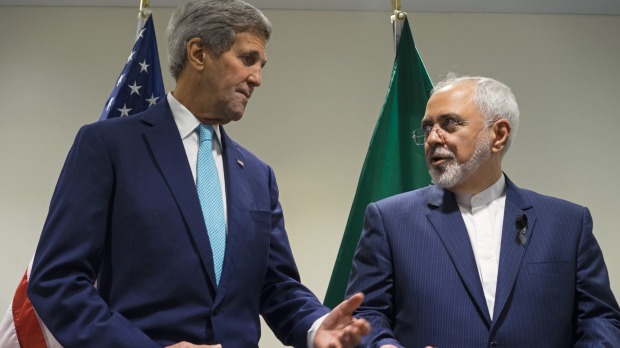IN THE MEDIA
The Iran nuclear deal – there is more work to do
May 30, 2016 | Colin Rubenstein

Colin Rubenstein
Canberra Times – May 30, 2016
The Iran nuclear deal known as the Joint Comprehensive Plan of Action was officially “implemented” in January this year when world powers lifted sanctions on Iran. So is the Iranian nuclear problem now solved, with the only problem for the international community to continue implementing the JCPOA?
Actually, both the Iranian regime and the two presumptive US presidential candidates are today acknowledging that the JCPOA is far from a finished stand-alone agreement – and there is still much to resolve if it’s to do what it’s intended to do.
Thus, in recent weeks, Iranian officials have lashed out at the US because Teheran has been failing to receive all the economic benefits it hoped for under the deal, and threatening to walk away from the agreement if it does not receive additional economic concessions. In particular, the Iranians are angry that most Western banks remain reluctant to do business with them, and want the US to do something about it.
For example, Iranian Foreign Minister Javad Zarif told The New Yorker on April 25 that “The United States needs to do way more. They have to send a message that doing business with Iran will not cost them. Period.” Zarif also said that while the nuclear deal is in place, “if one side does not comply with the agreement then the agreement will start to falter.”
It was widely anticipated that the implementation of the nuclear deal would enable Iran to receive sanctions relief of around $US150 billion, with many concerned Iran would use part of this money to increase its sponsorship of terrorist groups – such as Hezbollah in Lebanon and Syria, Hamas and Islamic Jihad in the Gaza Strip, Houthi rebels in Yemen, as well as the brutal Assad regime in Syria.
Yet according to a statement by US Secretary of State John Kerry, Iran has only received around $US3 billion in sanctions relief to date, though other sources say it is much more. Moreover, while businesses rushed to Teheran after the lifting of sanctions, reports say few actual deals have been signed because Iranians lack the foreign exchange to pay for such deals and cannot obtain international credit.
It has been suggested that it is in the Western world’s interest to facilitate increased trade, as Iran’s Revolutionary Guard Corps, the hardline body responsible for implementing Iran’s interference in its neighbours and support for international terror, among other matters, is resisting increased trade.
However, sanctions expert Mark Dubowitz states that experts calculate that the IRGC, having displaced much of the legitimate Iranian private sector, controls around 20-30 per cent of the Iranian economy, including strategic sectors most lucrative to international companies such as oil, gas, cars, telecommunications and mining.
While the US does retain some non-nuclear related sanctions on Iran, Iran’s poor financial regulations regarding tax avoidance, ongoing terrorist financing and money laundering appear to be the real cause of its problems in gaining access to Western banks. According to a policy paper earlier this month by Dr Matt Levitt, a former US senior intelligence official with expertise in terrorism and financial intelligence, a major concern for Western banks is the massive sanctions evasion network Iran has been using for the past decade, which continues to flourish, and the deceptive banking practices this involves.
Meanwhile, US presidential candidates are also signalling that the terms of the JCPOA are only the beginning of a negotiating process with Iran. Hillary Clinton has reportedly characterised the Iran deal as merely “a good start”, while Republicans such as her likely opponent Donald Trump have talked about ripping up or renegotiating the deal. Clinton said at the AIPAC Policy conference in March: “This deal must come with vigorous enforcement, strong monitoring, clear consequences for any violations and a broader strategy to confront Iran’s aggression across the region. We cannot forget that Teheran’s fingerprints are on nearly every conflict across the Middle East.”
This awareness, along with Iran’s desire to negotiate concessions may bring new opportunities to improve the nuclear deal. The weaknesses of the deal have already been on display. In March, Iran test fired two nuclear-capable ballistic missiles, claiming that, unlike the previous relevant UN resolution, the resolution now in force gives it the right to do so.
Other flaws in the deal include that it expires in around 10 years, its inspections regime is weak, and it fails to address Iran’s support for international terrorism.
Iran has shown it is determined to continue its provocative behaviour post-deal – this year there have been weapons shipments to Houthi rebels in Yemen believed to have originated from Iran; an Iranian diplomat offered to pay the families of Palestinian terrorists for committing attacks on Israelis; and Shi’ite militias backed by Iran committing atrocities in Iraq.
So how can the nuclear deal be improved at this late stage? Firstly, it should be viewed the way that Iranians do, namely as the start and not the end of the negotiations.
Moreover, world powers should consider using tough non-nuclear sanctions as well as additional or side agreements to provide incentives for Iran to curb its support for terrorism, its human rights abuses, its ballistic missile development and its regional destabilisation.
Given the great risks entailed, including catastrophic nuclear proliferation in the Middle East, responsible nations should be exercising greater vigilance and scrutiny, in their national interests, against Teheran. The upgrading of political or economic ties with Iran should be scrupulously limited until that country demonstrates that it can behave like a responsible, normal member of the international community.
Dr Colin Rubenstein is executive director of the Australia/Israel and Jewish Affairs Council. Previously, he taught Middle Eastern politics at Monash University for many years.
This story was found at: http://www.canberratimes.com.au/comment/the-iran-nuclear-deal–there-is-more-work-to-do-20160528-gp55wa.html
Tags: International Security, Iran





